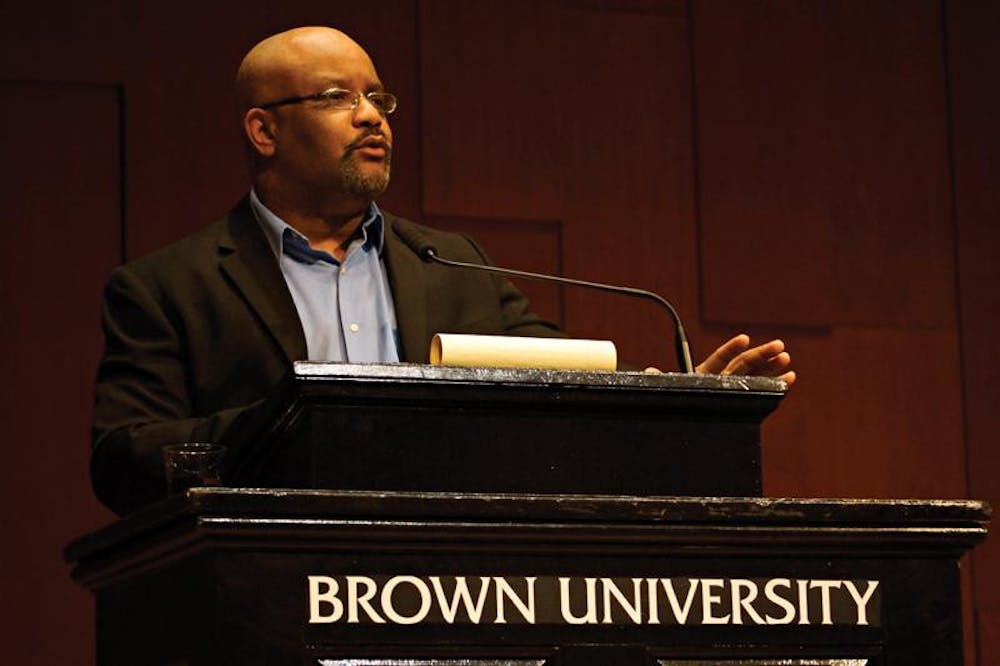"If I could name one thing that would improve black America the most, and I had a choice between getting rid of the (Ku Klux Klan) and getting rid of (Black Entertainment Television), getting rid of BET would take the cake," said Boyce Watkins, a speaker at a Janus Forum lecture Thursday evening entitled "Hip Hop: Should Artists be Accountable for their Words?"
At the event, held in Salomon 101, two speakers who explored the unproductive images and stereotypes portrayed in popular hip hop music, particularly its racial stereotypes and their effect on minority youth. The speakers urged audience members not to ignore this issue, both conceding that the content of hip hop music has very real consequences for minority communities.
Michael Eric Dyson, professor of sociology at Georgetown University, and Watkins, scholar in residence in entrepreneurship and innovation at Syracuse University, pointed to institutional racism, misogyny and homophobia, among other issues, as examples of issues that have been tied to hip hop music.
Watkins argued that, despite his love for the genre and the artists that make it, hip hop music sends harmful messages to black youth by glamorizing violence, misogyny, drug and alcohol use, ignorance, reckless spending and prison.
"Every day, they have been fed a precise formula for self-destruction," he said. "They've been taught everything they need to know to destroy themselves."
Dyson largely agreed, but he said he doubts there is a causal relationship between music and problems within the black community, saying that though hip hop may exacerbate some social issues, it is not the source.
"Were hip hop not to exist, all the problems that young black people and young people in general face today would persist," he said. He added that the controversy surrounding the genre stems from the country's confusion about the place of blacks in American culture.
Dyson also called for a more intellectual approach to the conversation about accountability in music. He said the argument surrounding hip hop, which does not enjoy the same amount of creative freedom as movies, for example, exposes people's unwillingness to recognize black musicians' artistic merit or intelligence.
"I presuppose the existence of artistic merit so I can engage in critique," said Dyson, who teaches a class on Jay-Z. "(Hip hop) expresses the worst and best of what it means to be a fragile human being in the process of existential evolution in a culture that both supports and subverts our fundamental human identity."
Both speakers talked extensively about the incarceration of minorities and how media outlets and American culture aggravate the problem.
BET's recognition of artists like Lil Wayne sends the message to black youth that the behavior expressed in his music is rewarded and leads to success, Watkins said. "Racism is most effective when the racist has black skin."
Both Watkins and Dyson acknwledged the appeal of the music of Lil Wayne, despite his effect on minority youth.
"I hate him because his music is so good that you can't help but like him," Watkins said. "He's probably the most powerful mega-pastor in America — he's just preaching the gospel of self-destruction."
Dyson called Lil Wayne a "rhetorical genius" and made a distinction between the artistry of Lil Wayne's portrayal of racism and misogyny and the music of artists such as Soulja Boy, which he said is without artistic merit or philosophical considerations.
"The first accountability is to make great art, not to be concerned about whether or not you offended somebody," he said. "You offend me with mediocrity."
This debate was one of a handful of events planned a year in advance by the Janus Steering Committee — which is made of representatives from various campus political groups — said Anish Sarma '12, co-director of the Janus Forum.
Audience members asked the speakers about artists who are breaking the trend, the role of the media and whether politicians and public intellectuals should also be accountable for their speech.
While Watkins proposed an adjustment in the output of rappers, media outlets and record labels, Dyson argued that artists should self-regulate.
"We must point this out to our children," Dyson said, "not by censoring the artist, but by informing the listener, so that the listener begins to make a choice."

ADVERTISEMENT




